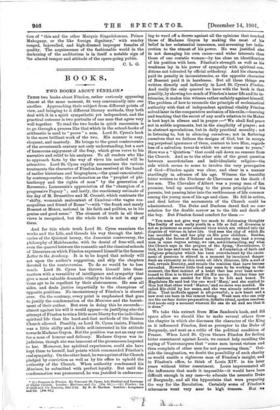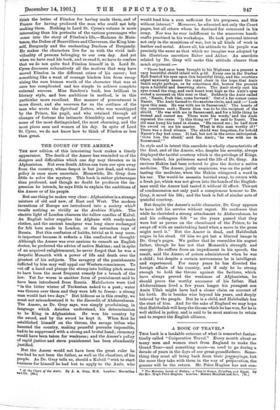BOOKS.
TWO BOOKS ABOUT FENEL ON.*
THESE two books about Fenelon, rather curiously appearing almost at the same moment, fit very conveniently into one another. Approaching their subject from different points of view, and bringing to it different literary methods, they both deal with it in a spirit sympathetic yet independent, and the practical outcome is two portraits of one man that agree very well together. To read the two books in quick succession is to go through a process like that which in the school-books of arithmetic is used to " prove " a sum. Lord St. Cyres's book is the more brilliant work of the two. His manner is easy, eloquent, and masterly. He brings to the great controversies of the seventeenth century not only understanding, but a sort of humorous enjoyment of the fray, which gives verve to his narrative and relief to his analyses. To all readers who like to approach facts by the way of views his method will be attractive. Lord St. Gyres rapidly summarises the various treatments the character of Fenelon has received at the hands of earlier historians and biographers,—the quasi-canonisation by contemporaries ; the acclamation as the "prophet of phi- lanthropy and the rights of man" by the generation of Rousseau ; Lamennais's appreciation of the "champion of a progressive Papacy " ; and lastly, the reactionary estimate of the day of M. Brunetiere and M. Cronsle, which contrasts the "shifty, womanish malcontent of Cambrai—the vague cos- mopolitan and friend of Rome "—with "the frank and manly Bossuet at Meaux, national in his faith and politics, as in his genius and good sense." The element of truth in all these views is recognised, but the whole truth is not in any of them.
And for this whole truth Lord St. Cyres examines the works and the Life, and threads his way through the intri- cacies of the Quietest heresy, the Jansenist controversy, the philosophy of Alalebranche, with its denial of free-will, and even the quarrel between the romantic and the classical schools of literature on which Fenelon expressed himself in the famous Letter to the Academy. It is to be hoped that nobody will act upon the author's suggestion, and skip the chapters devoted to the controversies. To do BO would be to lose much. Lord St. Cyres has thrown himself into these matters with a versatility of intelligence and sympathy that give a most valuable dramatic vitality to his studies of ques- tions apt to be repellent by their abstruseness. He sees all sides, and deals justice impartially to the champions of opposite positions. No inconsistency of Fenelon's is slurred over. On the contrary, every point is emphasised that goes to justify the condemnation of the irfaximes and the banish- ment of their author. But even in doing this he succeeds— almost against his will it would appear—in justifying also the attempt of Fenelon to win a little more liberty for tbe individual spiritual life than the hard-and-fast methods of the Roman Church allowed. Possibly, as Lord St. Cyres insists, Fenelon was a little shifty and a little self-interested in his attitude towards Madame Guyon. But the position was not an easy one for a man of honour and delicacy. Madame Guyon was in- judicious, though she was innocent of the grossnesses imputed to her. Moreover, her spiritual experiences, could she have kept them to herself, had points which commanded Fenelon's real sympathy. On the other hand, he was a priest of the Church pledged by conviction as well as by his office to uphold the authority of the Church. When authority condemned his Maximes, he submitted with perfect loyalty. But until the condemnation was pronounced, he was justified in endeavour-
• (L) Francois Sc Fi-nelon. By Viscount St. Cyres, late Student and Lecturer of Christ Church. London Methuen and Co. 1105. Bd.]—(2.) Fenelon : his Friends and his Enemies, INZ-171,3. By E. K. Sanders. London : Longinans bud Co. [1.0a. 6<1.]
ing to ward off a decree against all the opinions that touched those of Madame Guyon by making the most of his belief in her substantial innocence, and screening her indiscretion to the utmost of his power. He was justified also in not damaging his own cause—and wider interests than those of one ecstatic woman—by too close an identification of his position with hers. Fenelon's strength as well as his weakness lay in his power of sympathy with spiritual con.
ditions not tolerated by official orthodoxy. And his character paid its penalty in inconsistencies, as the opposite character of Bossuet paid it in harshness. But all these things are written directly and indirectly in Lord St. Cyres's Fenelon. And really the only quarrel we have with the book is that possibly, by showing too much of Fenelon's inner life and its in- tricacies, it makes him witness rather unfairly against himself. The problem of how to reconcile the principle of ecclesiastical authority with that of independent spiritual vitality Fenelon solved later in the comparative seclusion of his exile,—learning and teaching that the secret of any soul's relation to its Maker is best kept in silence and in prayer :—" We shall find peace not in subtle arguments, but in the simplicity of prayer; not in abstract speculations, but in daily practical morality ; not in listening to, but in silencing ourselves ; not in flatterinp ourselves that we fathom the designs of God, but in accept- ing perpetual ignorance of them, content to love Him, regard.
less of a salvation towards which we never cease to yearn." Here was a " Quietism" that could call down no censure from the Church. And as to the other side of the great question between sacerdotalism and individualistic religion—the side which seems to some to involve the very prerogative of God—Fenelon again was clear, and clear in a manner
startlingly in advance of his age. Witness the beautifuj letter written to the Duchesse de Chevreuse on the death ( f
her son. The Chevalier d'Albert was a young man of fine promise, bred up according to the pious principles of his parents, but passing later into the recklessness of life common among the young men of his age and class. He fell in action,, and died before the sacraments of the Church could bo administered. The Duke and Duchess dared find no con. solation for the double sorrow as to the life and death of' the boy. But Fenelon found comfort for them :—
"You must not give way too much to distressing thought* The frailty of such early youth in a life so full of diversion ix not so poisonous as some sensual vices which are refined into the disguise of virtues in later life. God sees the clay of which He has moulded us, and has pity on His poor children. Besides, although the forces of Nature and examples may lead a young man in some degree astray, we can, notwithstanding, say what the Church says in the prayers of the dying, 'Nevertheless, 0 God, his hope and trust was in Thee.' A foundation of faith and religious principles which has been overwhelmed by the excite meat of passions is stirred in a moment by imminent danger Such an extremity as this routs all life's illusions, lifts a sort of veil, reveals Eternity, and recalls the realities that have become shrouded. However little God may seem to be working in that moment, the first instinct of a heart that has ever been accus- tomed to Him is to throw itself on His mercy. Neither time nor exhortations are needed for Him to be felt and heard. To Magdalene He said but the one word 'Mary,' and she replied to aim but that other word Master,' and no more was needed. He called His child by her name, and she was already returned to Him. That ineffable appeal is all-powerful; a new heart and a new soul are born in the inmost being. Weak men who can only see the surface desire preparation, definite ritual, spoken resolves. God needs only a moment wherein He can do all and see that it is done."
We take this extract from Miss Sanders's book, and did space allow we should like to make several others from the chapter in which she discusses the character of the King as it influenced Fenelon, first as preceptor to the Duke of Burgundy, and next as a critic of the political condition of France. When Lord St. Cyres blames Fenelon for feeling bitter resentment against Louis, we cannot help recalling the saying of Vauvenargues that "some men invent virtues and then complain of other men for not possessing them." Out- side the imagination, we doubt the possibility of such charity as would enable a righteous man of Fenelon's insight, and in Fenelon's office, to think of Louis XIV, in his later years without bitter resentment. Louis impersonated all the influences that made it impossible—it would have been difficult enough in any case—to educate the neurotic) Duke of Burgundy, and all the hypocrisies that were preparing the way for the Revolution. Certainly some of Fenelon's utterances went very near to high treason. But we
think the better of Fenelon for having made them, and of France for having produced the man who could not help making them. Nothing in Lord St Cyres's volume is more interesting than his portraits of the various personages who -come into the story of Fenelon's life,—Madame de Main- tenon, the Dukes of Beauvilliers and Chevreuse, the King him- .self, Burgundy and the enchanting Duchess of Burgundy. He makes the characters live for us with the vivid indi- viduality of persons belonging to our own day. And yet when we have read his book, and re-read it, we have to confess that we do not quite find Fenelon himself in it. Lord St. Cyree discusses exhaustively all the motives that may have moved Fenelon in the different crises of his career; but something like a want of courage hinders him from recog- nising the rare human worth of the character that was at -once too complicated and too simple to achieve complete external success. Miss Sanders's book, less brilliant in literary style, and less ambitious in method, is in this particular more excellent. Her manner of presentment is more direct, and she recovers for us the outlines of the -man who wrote the Spiritual Letters, who was worshipped ty the Prince, his pupil, and who retained through all changes of fortune the intimate friendship and respect of some of the most distinguished, the most charming, and the most pious men and women of his day. In spite of Lord St. Cyres, we do not know how to think of Fenelon as less than great















































 Previous page
Previous page